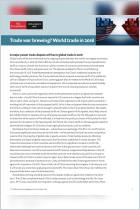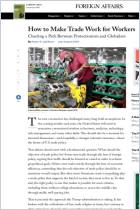Зарегистрируйтесь на getAbstract, чтобы получить доступ к этому краткому изложению.

Зарегистрируйтесь на getAbstract, чтобы получить доступ к этому краткому изложению.
David Dollar and Eswar Prasad
What have we learned from the trade war with China?
Dollar & Sense podcast
Brookings Institution, 2019
Что внутри?
US–China trade negotiations continue, but resolutions of the disputes are uncertain.
Recommendation
In this illuminating podcast, David Dollar, a senior fellow at Brookings, interviews economist Eswar Prasad about developments in and possible outcomes of the US–China trade negotiations. In their insightful dialogue, conducted shortly before the December 2019 announcement of a proposed phase-one deal, the two discuss structural elements of the Chinese economy and their importance in the conflict. Business executives and policy analysts interested in a broad perspective of the state of US–China economic relations will glean valuable information from this concise conversation.
Summary
About the Podcast
David Dollar conducts the Dollar and Sense podcast series on economic topics at the Brookings Institution. Eswar Prasad is an economics professor at Cornell University.




























Comment on this summary